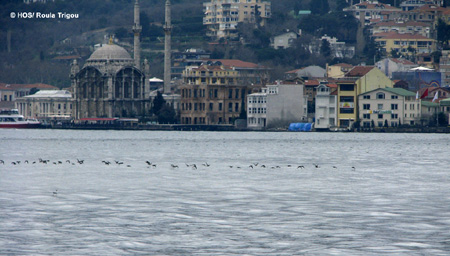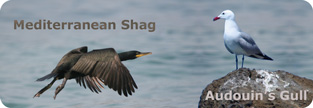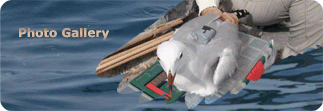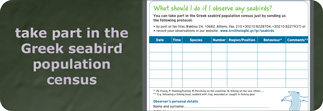 In an effort to demonstrate the importance of the Aegean Sea for birds, irrelevant of national border lines, the two BirdLife1 partners in Greece and Turkey, the Hellenic Ornithological Society (HOS) and Doğa Derneği (DD), have decided to join forces and carry out a common project for the regular monitoring of the Yelkouan Shearwaters, along the species migratory route.
In an effort to demonstrate the importance of the Aegean Sea for birds, irrelevant of national border lines, the two BirdLife1 partners in Greece and Turkey, the Hellenic Ornithological Society (HOS) and Doğa Derneği (DD), have decided to join forces and carry out a common project for the regular monitoring of the Yelkouan Shearwaters, along the species migratory route.
The Yelkouan Shearwater is a seabird species, endemic of the eastern and central Mediterranean, that nests in uninhabited islets of Greece, Italy, France, Tunisia and Malta, and winters in the Mediterranean and Black seas. Many pass through the Bosphorus Straits and the northern Aegean Sea, in early spring, in the route towards the breeding grounds in the Mediterranean Sea, and follow the reverse route in late autumn during the trip to the wintering grounds in the Black Sea. Hence, the conservation of the species is directly linked with measures that will make the migration routes as safe as possible.
The species has been classified by the IUCN2 as near threatened and HOS, DD and BirdLife International considered it as a perfect example to demonstrate the need for coordinated international efforts along the species migration route. Therefore, they decided to start simultaneous counts at the Bosphorus straits and at the Aegean islands of Lesvos and Lemnos, to clarify the seasonal significance of these sites for the migration of the species. Furthermore, these counts will enable both partners to identify the most significant marine sites for the species migration, and propose them to be included in the international BirdLife global network of the more than 10.000 Important Bird Areas.
After an international workshop organized at Istanbul in February, the counts have been initiated by birdwatchers in Istanbul Birdwatching Club in March and the first results are rather astonishing, with numbers exceeding 25.000 birds/day in the Bosphorus and more than 14.000 birds/day at Lesvos island, proving the critical significance of these sites for the species migration.
Both HOS and DD hope that this first common monitoring project can be followed by more decisive steps for the conservation of this, and other, common species. The birds and biodiversity of the Aegean Sea certainly need this kind of approach.
This work is being funded in Greece by the EU LIFE+ fund, in the framework of the LIFE Project “Concrete conservation actions for the Mediterranean Shag and Audouin's Gull in Greece, including the inventory of relevant marine IBAs” and in Turkey by the Royal Society for the Protection of Birds UK.
For more information, please contact:
Greece: Roula Trigou, Public Awareness Projects Coordinator, rtrigou@ornithologiki.gr
Turkey: Yesim Erbasol, Communication Officer, yesim.erbasol@dogadernegi.org
1 BirdLife International is a global Partnership of conservation organisations that strives to conserve birds, their habitats and global biodiversity, working with people towards sustainability in the use of natural resources. BirdLife Partners operate in over one hundred countries and territories worldwide.
2 International Union for Conservation of Nature










 In an effort to demonstrate the importance of the Aegean Sea for birds, irrelevant of national border lines, the two BirdLife1 partners in Greece and Turkey, the Hellenic Ornithological Society (HOS) and Doğa Derneği (DD), have decided to join forces and carry out a common project for the regular monitoring of the Yelkouan Shearwaters, along the species migratory route.
In an effort to demonstrate the importance of the Aegean Sea for birds, irrelevant of national border lines, the two BirdLife1 partners in Greece and Turkey, the Hellenic Ornithological Society (HOS) and Doğa Derneği (DD), have decided to join forces and carry out a common project for the regular monitoring of the Yelkouan Shearwaters, along the species migratory route.

